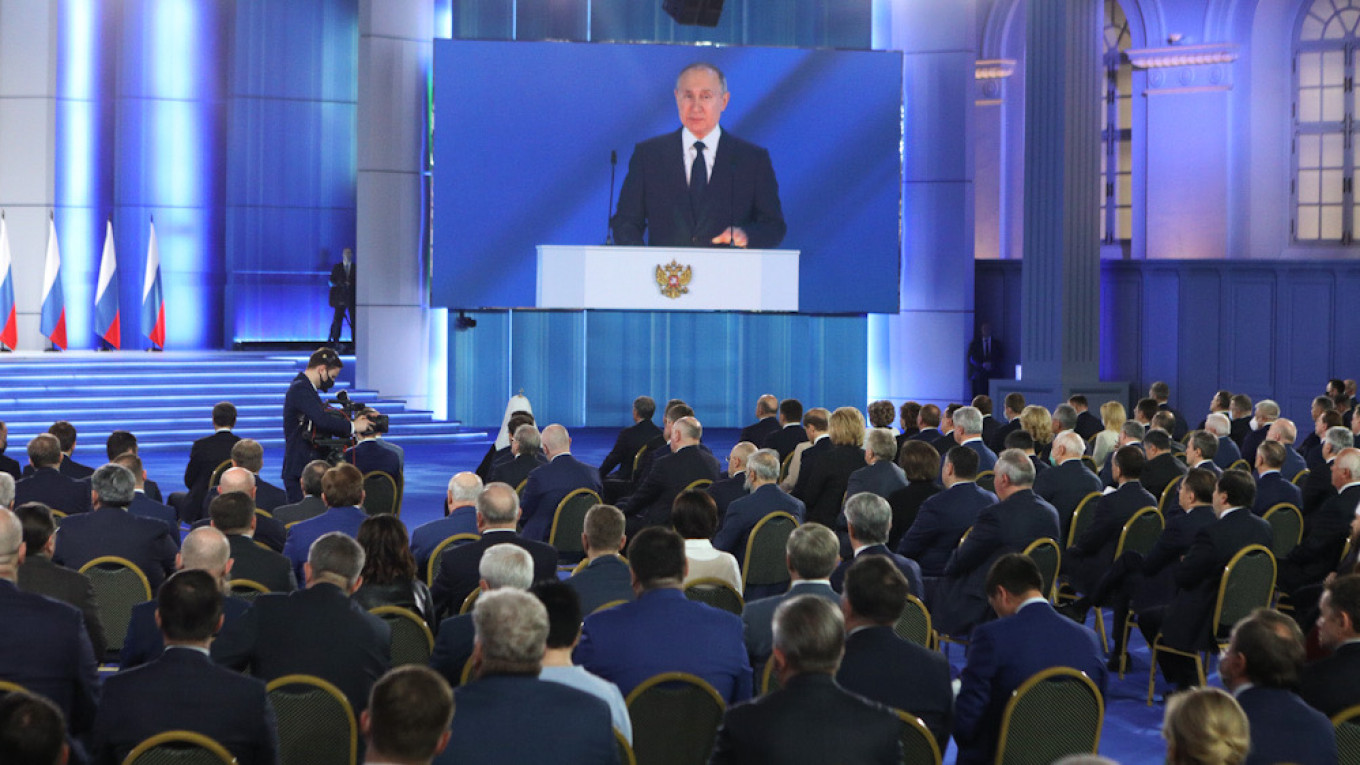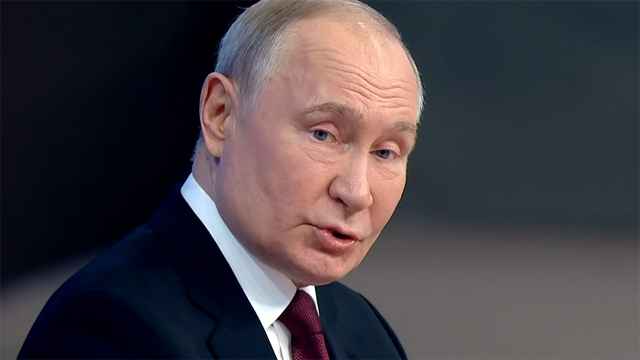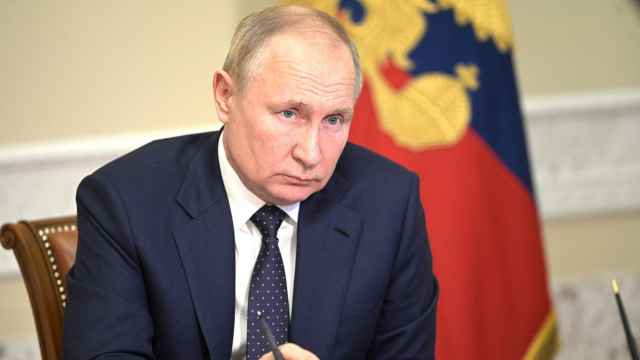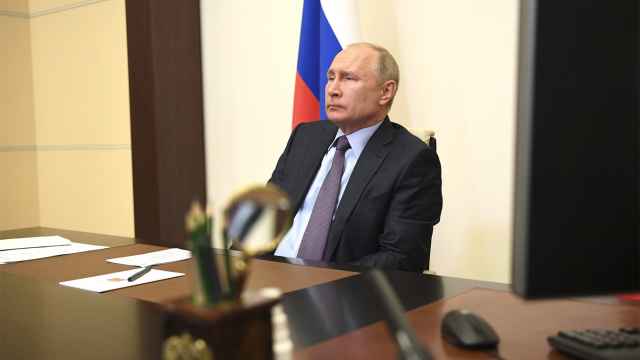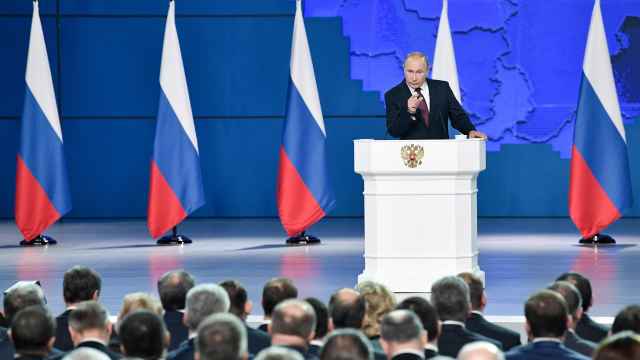With troops massing on the border with eastern Ukraine, Alexei Navalny languishing in jail, mass protests planned across Russia, rumors of closer integration with Belarus and relations with the West at a new low, President Vladimir Putin’s annual state of the nation address Wednesday had promised fireworks.
In the end, few exploded.
Instead, Putin’s speech was relatively low-key, focused almost exclusively on tinkering with Russia’s domestic problems and trying to address Russians’ top concerns — the country’s economic plight and their dwindling living standards.
Speaking near the Kremlin in Central Moscow on Wednesday, at the same location Navalny supporters planned to gather for unauthorized protests hours later, Putin outlined a host of new spending pledges and schemes designed to give hard-pressed Russian families a little extra cash in the run-up to parliamentary elections scheduled later this year.
“The main thing is to ensure the growth of real incomes of citizens,” Putin told the assembled parliamentarians and regional governors who had gathered for the address.
“We must restore real incomes and ensure further growth, to achieve tangible results in the fight against poverty,” he added.
In line with what he called Russia’s “consistent policy” when it comes to economic stimulus, Putin tied almost all the cash handouts to families and low earners with young children.
The biggest measure will be a one-off payment of 10,000 rubles ($130) per child to families with school-age children. The cash will be sent in August, just one month before Russians are set to head to the polls in a closely watched election to the State Duma.
Amid the pandemic and eight years of falling living standards, support for the ruling United Russia party has sunk to its lowest level since the annexation of Crimea. It also faces a new challenge in the upcoming vote in the shape of Navalny’s nationwide tactical voting campaign, which urges his supporters to back the candidate in their district which has the best potential to beat a United Russia contender, irrespective of their party affiliation or views, and has shown some success in local elections.
“This was, of course, purely a pre-election message,” said Tatiana Stanovaya, founder of the R.Politik analysis consultancy.
“The President said a lot about the distribution and redistribution of resources — these are extremely important topics in an election year,” said Boris Makarenko, President of the Center for Political Technologies.
Despite the flurry of announcements and plans, the numbers involved are relatively low, reflecting Putin’s decades-long caution when it comes to loosening the pursestrings. While those who receive the payments will get a small boost, the bonuses are unlikely to ease Russia’s current economic predicament or its long-term crisis in living standards, economists predicted.
Overall, the package of measures announced will cost the Russian government 400 billion rubles ($5.2 billion) over the next two years, Russia’s Finance Minister Anton Siluanov said after the speech — equivalent to 0.2% of Russia’s GDP per year.
“I don’t think there was anything special in there,” economist Vladislav Inozemtsev, director of the Center for Post-Industrial Studies told The Moscow Times. “It was just a collection of all the traditional slogans and promises.”
“There’s really nothing to talk about,” said Russian economist Sergei Guriev, professor at France’s Sciences Po university and a Navalny ally. “They are welcome but very small measures — 0.2% of GDP is a rounding error for the federal budget.”
“The announced social support measures are too modest in volume to affect growth,” added ING Bank’s Russia economist Dmitry Dolgin.
Among some of the other spending commitments announced by Putin were higher support payments for single parents of 5,650 rubles ($73) a month per child, and 6,350 rubles ($83) a month for expectant mothers on low incomes. For comparison, the average monthly salary in Russia was 51,100 rubles ($667) last year.
Away from the economy, Putin issued his strongest call yet to Russians to get vaccinated, amid widespread public skepticism which has seen only 10 million of the country’s 115 million adults have the jab so far.
He outlined new steps Russia would take to tackle climate change, pledging to reduce emissions to below EU levels and telling the country’s largest cities they need to cut emissions by at least 20%. The speech was also littered with promises to improve Russia’s infrastructure — from tourist resorts to motorways — and commitments to tap into Russia’s $180 billion sovereign wealth fund to pay for the revamps.
Despite the address coming amid huge international tensions between Russia and the West over a host of issues — and concerns Putin could use the speech to signal a dramatic escalation on any number of them — it signalled a clear focus on domestic priorities, in line with what Russians wanted to hear.
Ahead of the speech, a survey by the state-run VTsIOM polling organization found just 4% of Russians thought Putin should use the opportunity to focus more on foreign policy than domestic issues.
The president spoke after the coronavirus pandemic triggered another drop in living standards, which were already a pressing concern. Real disposable incomes have now fallen by 11% since 2013 — pushed down first by the 2014-16 economic crisis and then Kremlin policies which have prioritized macroeconomic stability and fiscal prudence over growth.
Analysts saw little signs of a comprehensive overhaul of that underlying approach in the speech.
“In general, it looks like a more detailed elaboration of the same agenda that’s been in place over recent years — just adjusted for the consequences of the pandemic through support for families with children, and some new challenges such as climate,” said Alfa Bank chief economist Natalia Orlova.
Some were more dismissive.
“Economic growth can be fueled only through an upsurge in consumer demand,” added Inozemtsev. “And Putin once again is trying to manage that through huge infrastructure investments. I don't think it will work.”
A Message from The Moscow Times:
Dear readers,
We are facing unprecedented challenges. Russia's Prosecutor General's Office has designated The Moscow Times as an "undesirable" organization, criminalizing our work and putting our staff at risk of prosecution. This follows our earlier unjust labeling as a "foreign agent."
These actions are direct attempts to silence independent journalism in Russia. The authorities claim our work "discredits the decisions of the Russian leadership." We see things differently: we strive to provide accurate, unbiased reporting on Russia.
We, the journalists of The Moscow Times, refuse to be silenced. But to continue our work, we need your help.
Your support, no matter how small, makes a world of difference. If you can, please support us monthly starting from just $2. It's quick to set up, and every contribution makes a significant impact.
By supporting The Moscow Times, you're defending open, independent journalism in the face of repression. Thank you for standing with us.
Remind me later.



